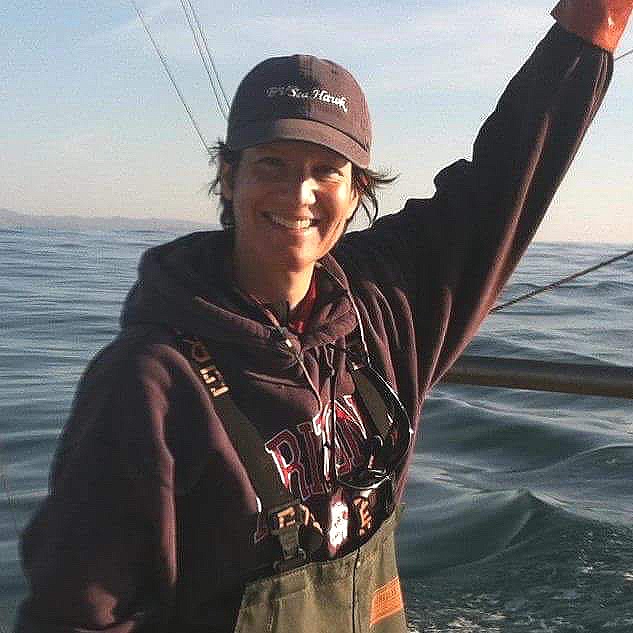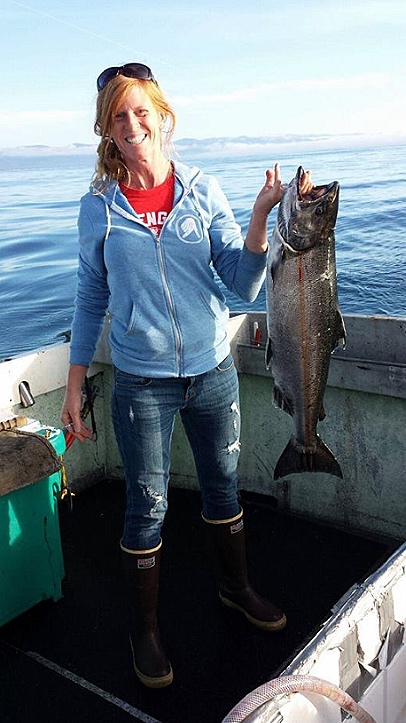Why do we still use the word “fisherman?”
Jane DeLay - ‘Fisherman’
While the rules of grammar don’t change, the words we use do. Over the past few decades gendered words like policeman, fireman and councilman have given way to police officer, firefighter and councilmember.
Yet, the word “fisherman” has resisted change and remains the most common term for people who harvest fish, regardless of their gender. Words like fisherwoman, fisherfolk and fisher are all correct, but they haven’t found themselves widely used in common language.
The simplest answer to why the word “fisherman” remains in such common use is that most women who are employed harvesting fish prefer to use the word to describe themselves. Of course, there are exceptions.
“I usually say fisherman,” says Valerie Faulk, 32, who fishes on the F/V Aqua Leo out of Santa Cruz. “In my position on the boat I do the same job as the boys, so why try and make a point to verbally announce I’m different when it’s so obvious visually?”
Faulk has used the term “fisherwoman” to describe herself, but says it doesn’t roll off the tongue well and it often makes a statement she doesn’t intend to. She’ll also use the term “commercial fisher,” but she says “I’ve been around the industry all my life, it’s just natural to say fisherman.”
The Associated Press Stylebook, the standard for journalism in the United States, doesn’t rule one way or another on the usage of the words fisherman and fishermen. But in an Associated Press “Ask the Editor” submission, the news organization answered a question regarding the words fisherman and fisherwoman with this response:
Coco Faulk - ‘Fisherwoman’
“While fisherwoman is occasionally used in AP stories, fisher is more versatile. A plural alternative for both genders: fishermen and women.”
Coco Faulk, Valerie Faulk’s mother and co-owner of the Aqua Leo with her husband Tom, has a different opinion than her daughter.
“Definitely fisherwoman,” Coco Faulk, 54, says. “We used to be only recognized as the wife of a fisherman, but I’m a woman and I fish so I’m a fisherwoman.”
Carol Lynn McKibben, a Stanford University professor and Monterey-based historian who has written extensively on race, gender and immigration in Monterey County, prefers to use the plural “fisherfolk” and the singular “fisher” in her writing.
Ann McLean Hanson - ‘Fisherman’
While McKibben acknowledges that some women might prefer to be identified by the word “fisherman,” she still thinks it’s important to challenge gender norms within language.
“Gendered language embeds us in ways of thinking,” McKibben says. “How many little girls would want to grow up to be fishers, but don’t do it because of the masculine word ‘fisherman.’”
Joleen Lamber Skinner, deckboss on the F/V Pioneer, doesn’t think about the word fisherman in a gendered way but as an, ahem, “layman’s term.” Lambert also owns a ranch in Carmel Valley and has a number of horses.
“I ride horses and I call myself a ‘horseman,’” she says. “But if others call me fisherwoman or horsewoman that’s great too.”
The Monterey County Weekly, the largest newspaper by circulation in the Monterey Bay area, typically uses the term “fisherman” in print even as they primarily use gender-neutral alternatives for most words.
“I generally encourage reporters to defer to the term that a source prefers,” says Sara Rubin, editor of the Weekly. “We've kept to fishermen because that seems to be the way the people we're writing about describe themselves. Sometimes part of incorporating a new term means sources also believing it accurately represents them in print. I can see phasing it in over time, even switching back and forth within a story or two, to soften the transition.”
So what is it: fisherman, fisherwoman or fisher?
There’s no right or wrong answer. The best policy is to use the prefered term of the person you’re speaking about. So call Coco Faulk a fisherwoman, but feel free to call her daughter a fisherman.
Joeleen Lambert Skinner ‘Fisherman/Fisherwoman.’ Photo credit: David Hills 2018 (Fishy Pictures)




